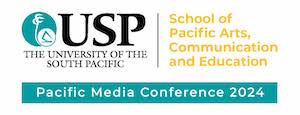The University of the South Pacific journalism programme is hosting a cohort student journalists from Australia’s Queensland University of Technology this week.
Led by Professor Angela Romano, the 12 students are covering news assignments in Fiji as part of their working trip.
The visitors were given a briefing by USP journalism teaching staff — Associate Professor in Pacific journalism and programme head Dr Shailendra Singh, and student training newspaper supervising editor-in-chief Monika Singh.

The students held lively discussions about the form and state of the media in Fiji and the Pacific, the historic influence of Australian and Western news media and its pros and cons, and the impact of the emergence of China on the Pacific media scene.
Dr Singh said the small and micro-Pacific media systems were “still reeling” from revenue loss due to digital disruption and the covid-19 pandemic.
As elsewhere in the world, the “rivers of gold” (classified advertising revenue) had virtually dried up and media in the Pacific were apparently struggling like never before.
Dr Singh said that this was evident from the reduced size of some newspapers in the Pacific, in both classified and display advertising, which had migrated to social media platforms.
Repeal of draconian law
He praised Fiji’s coalition government for repealing the country’s draconian Media Industry Development Act last year, and reviving media self-regulation under the revamped Fiji Media Council.
However, Dr Singh added that there was still some way to go to further improve the media landscape, including focus on training and development and working conditions.
“There are major, longstanding challenges in small and micro-Pacific media systems due to small audiences, and marginal profits,” he said. “This makes capital investment and staff development difficult to achieve.”
The QUT students are in Suva this month on a working trip in which students will engage in meetings, interviews and production of journalism. They will meet non-government organisations that have a strong focus on women/gender in development, democracy or peace work.
The students will also visit different media organisations based in Suva and talk to their female journalists on their experiences and their stories.
The USP journalism programme started in Suva in 1988 and it has produced more than 200 graduates serving the Pacific and beyond in various media and communication roles.
The programme has forged partnerships with leading media players in the Pacific and our graduates are shining examples in the fields of journalism, public relations and government/NGO communication.
Asia Pacific Report publishes in partnership with The University of the South Pacific’s newspaper and online Wansolwara News.
- The university is hosting a Pacific Media Conference in partnership with the Pacific Islands News Association (PINA) and the Asia Pacific Media Network (APMN) in Suva on 4-6 July 2024.
This content originally appeared on Asia Pacific Report and was authored by Wansolwara.
Wansolwara | Radio Free (2024-02-12T23:50:59+00:00) Australian student journos explore Fiji media landscape with USP team. Retrieved from https://www.radiofree.org/2024/02/12/australian-student-journos-explore-fiji-media-landscape-with-usp-team/
Please log in to upload a file.
There are no updates yet.
Click the Upload button above to add an update.